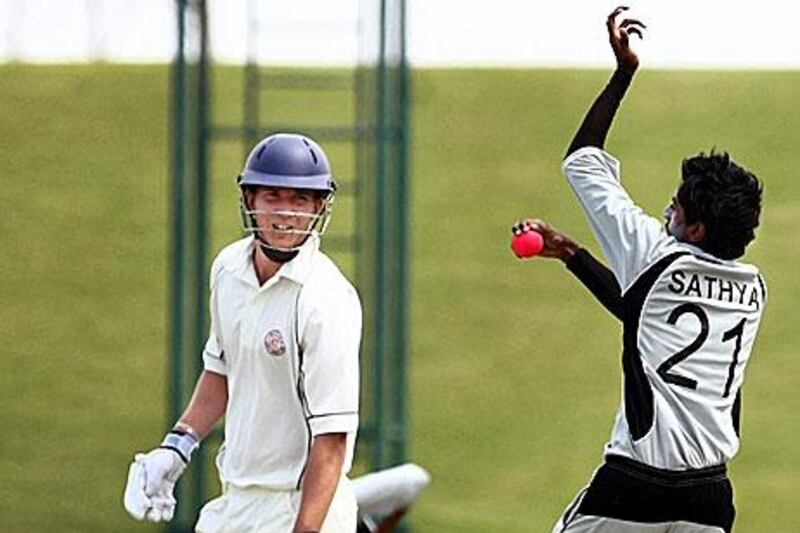ABU DHABI // A year after using a pink ball in a first-class match for the first time, MCC are back in the capital and turning the Zayed Cricket Stadium into a cricket laboratory again.
Now they are trying out a new format of 50-over cricket which they hope will help revive the one-day game and attract a new audience of sports fans to matches.
In a bid to re-energise limited-overs cricket, the new game is played in micro "splits", where one side bats for five overs, then swaps around and fields.
________________________________________________
Cricket World Cup news
• World Cup may be most dramatic ever: ICC chief
• World Cup chagrin can be making of Shakib Al Hasan
• How the teams fared
• Sachin Tendulkar walking is a stark contrast to Ricky Ponting
• Kamran Akmal, best friend of every batsman and rival of Pakistan
________________________________________________
According to the method's creator, the new format will have a far greater appeal as it is clear to everyone all the way through which side is winning, rather than just towards the end of seven hours of cricket.
"The game of cricket could die," Dick Wood, the inventor of "5ives", said. "It is struggling to grow and attract sports fans. The crux of my whole idea is the reason cricket is struggling and has always struggled is, for the majority of people the game is too dull and boring.
"The way cricket is played at the moment, it only gets exciting towards the end. There are two ways of addressing that.
"The first is the Twenty20 method which says, this game only gets exciting towards the end, so let's bring the end closer to the beginning, and get rid of as much of the boring bit as we can. The other method is this one."
Wood likens the way cricket is currently played to asking Roger Federer to serve 200 balls, then letting Rafa Nadal serve 200 points back at him, and deciding the winner that way.
"When you watch that match, they will still have played the same magnificent shots and had high quality rallies, but it will have been dull and boring," he said.
"If you told anyone to play tennis like that, they would look at you and tell you that you have gone completely crazy.
"You ask yourself: why did some clever chap think, hundreds of years ago, that tennis should be played the way it is played?"
One major enhancement of his method is it nullifies the advantage the side winning the toss might otherwise enjoy, which often renders one-day matches predictable.
For example, whoever wins the toss at the R Premadasa Stadium in Colombo when England play Sri Lanka in their World Cup quarter-final on Saturday is almost certain to bat first, as 66 per cent of ODIs played there have been won by the side who does that.
That ratio would almost certainly be more equal if the sides bat in alternate, five-over splits.
The guinea pigs in Abu Dhabi this week were the MCC Young Cricketers and the Combined Universities. With the Zayed Stadium pitch at its freshest, the students lost two wickets in the first over of the game.
Had they been forced to carry on as usual, general wisdom suggests they would have struggled to battle back.
However, in the 5ives format, they were then able to bowl after just five overs.
They lost the first split - they had made 15 for two compared to their opponents' 33 without loss - yet ended up recovering to win both the match by five wickets, as well as the collective split tally.
"It gave us a chance to regroup," Rob Woolley, the captain of the Combined Universities side, said. "We looked to get back into the game by winning the splits: rather than looking long-term, we looked short-term."
For cricketers used to the traditional mode, the format is not simple to grasp at first.
Wood, a qualified actuary, has made a flying visit to Abu Dhabi from his home in Cape Town to answer any queries, and he was not short of work.
However, the response was positive. "I think it will catch on because it increases the intensity of the game," Woolley said.
There is a proposal in place to play a triangular tournament using the format, involving the A teams from England and South Africa and one other nation, in the UAE in October.






